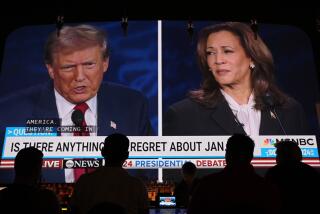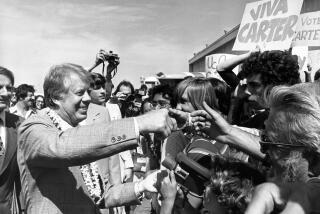Why Are These Men Smiling?
- Share via
Between now and Nov. 2, President Bush and Sen. John F. Kerry will do an awful lot of smiling. So will Vice President Dick Cheney and Sen. John Edwards. Though possibly not at one another.
Being seasoned political campaigners, these men must know how few opportunities arise in the course of a single day to make a real impression upon voters. The chance to make a lasting one -- the kind replayed on TV, the kind that leads a front page -- is even more elusive.
No wonder they smile a lot. Nothing else can convey a positive, upbeat, energetic, trustworthy and, above all, electable image as instantly or as effectively as an open smile. On the other hand, they can smile too much. By overdoing it, or doing it implausibly, the candidates would not only run the risk of losing voters, they could also play into the hands of their shrewd opponents, who would gladly cast them in the role of show pony or fool.
Or, smiling incessantly, these men could simply seem shallow or even desperate. Often, this can be a matter of bad luck, as for example when a beaming candidate suddenly comes face to face with a war widow or an amputee.
The success of a political smile depends on the harsh light of strong opinion. So a staunch Democrat will far more willingly see the Bush smile as pinched or cold or narrow, for example, than open or friendly or good-humored -- surely the impression it is likely to create for the Republican faithful at Madison Square Garden next week.
Before the invention of photography in about 1840, the facial gymnastics of politicians was almost invisible and largely irrelevant. The politician’s face was only rarely seen in the flesh -- at least by the vast majority of eligible voters.
In public, 19th century presidents and presidential candidates smiled very little. There are anecdotes about how young Abe Lincoln spun yarns and made the boys whoop and roll off the log. But in later life, the 16th president was portrayed as mostly grave. Enshrined on the $5 bill, his image has stayed that way.
By contrast, 20th century presidents smiled a good deal. Theodore Roosevelt, whose flashing white teeth fascinated Europeans, set the pattern well before he took office in 1901. Roosevelt became so well known for his broad grin that when he died in 1919 it was widely reported that the cause of death was an infected tooth, which was not true.
In any case, most of Roosevelt’s successors beamed at the drop of a hat: Herbert Hoover, in the face of all possible reason, at baseball games during the Depression; FDR with a jauntily cocked cigarette holder; Eisenhower on the golf course; or Lyndon Johnson pulling the ears of one of his beagles. Nixon’s smile was especially energetic, that of a true professional -- worn gamely to the very end.
Presidents are to some degree by definition “presidential,” and their smiling habits may flourish in the charmed arena of the White House, while prospective future tenants are not so fortunate. Candidates must somehow make a good impression while convincing the American people that they can be presidential if they have to be.
At times, that will call for gravity and seriousness, as much as it requires nerve, endurance and, of course, the common touch. Inevitably it will also involve some tricky choices. When and in what situations will his campaign people urge Kerry to turn on his smile, or switch it off?
After all, in 2004 there is not much to smile about. Apart from Iraq, there are Al Qaeda, Gaza and North Korea lurking in the background. And as much as the economy may offer cheerful prospects, Wall Street smiles will flow freely only upon payment of dividends -- in other words, not yet.
The task that faces Bush and Kerry is formidable -- enough to bring tears to the eyes, for no other reason than that between now and November, despite sore feet, aching backs and bad meals, they will have no choice but to keep smiling. And they must know that the rest of us are better at seeing through that smile than we’re given credit for.
More to Read
Get the L.A. Times Politics newsletter
Deeply reported insights into legislation, politics and policy from Sacramento, Washington and beyond. In your inbox twice per week.
You may occasionally receive promotional content from the Los Angeles Times.










